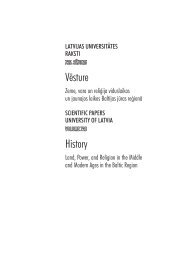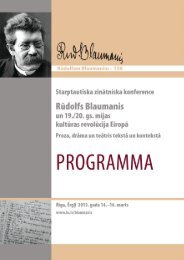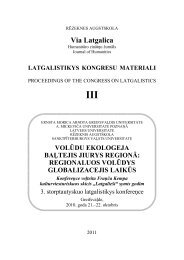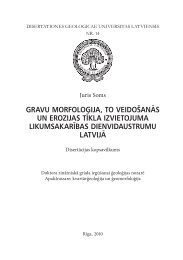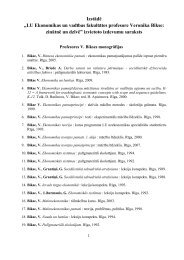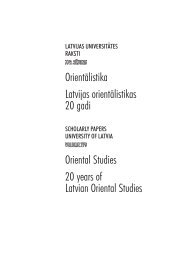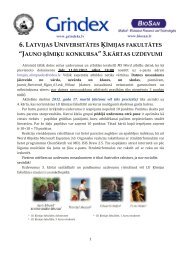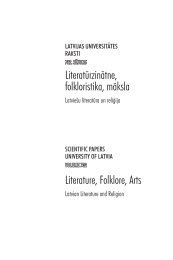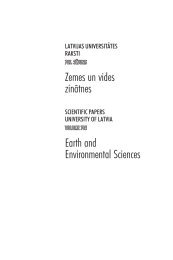Untitled
Untitled
Untitled
Create successful ePaper yourself
Turn your PDF publications into a flip-book with our unique Google optimized e-Paper software.
10 LITERATÛRZINÂTNE, FOLKLORISTIKA, MÂKSLA<br />
On the whole such judgements are not very original. Harsh attacks on the most<br />
powerful gods– usually through the mouths of demons can be found already in the<br />
Purânas– very bulky writings that perhaps are the main sources for today’s Hinduism.<br />
The daitya Târaka in “Ðiva Purâna”, for instance, is allowed to say: “You gods<br />
are shameless, especially Indra and Vishnu…Vishnu is deceptive, defective and<br />
indiscreet…Taking birth as Râma he killed a woman…Sinful as he was he forsook<br />
his own wife (Sîtâ – V.I.)…In the sixth incarnation (as Paraðurâma – V.I.) he cut off<br />
the head of his own mother…Incarnating as Krishna he defiled the wives of others<br />
and forced them to violate the traditional virtues of the family.” 1 . Even taking into<br />
account that judgements about Vishnu occur in a shivaistic source, still it is remarkable<br />
that this happens within the fold of the same religion. One may agree here with<br />
the widely spread opinion that Hinduism is an extremely tolerant religion in all aspects.<br />
But a different interpretation is also possible: as morality in India was always<br />
regarded as part of the natural order of the Universe, authors in one way or another<br />
couldn’t escape making gods act as people are acting.<br />
The main task of this paper is to find in authoritative sources of Hinduism testimonies<br />
to the fact that strong mundane individual and social ethics in them have always<br />
coexisted with spiritual strivings and that India does not really need to import<br />
Kant’s or some other Westerner’s ideas to tackle contemporary ethical problems. The<br />
preoccupation with moksha or liberation as the supreme goal, the identification of<br />
one’s innermost soul with the Soul of the Universe, at the cost of enjoying pleasures<br />
provided by the senses, seems to dominate all traditional Indian thinking, including<br />
literature, theatre and other arts. But there is also a genuine striving to advise the<br />
human individual to concentrate his efforts mainly on artha (worldly success) and<br />
kâma (mainly love) at the expense of dharma (religious ends).<br />
This idea may be rooted in the commonplace assertions that being one of the<br />
many living beings man still stands above them and even above the devas– lower<br />
gods. “Mahâbhârata” declares that “there is nothing higher than the human being” and<br />
in “Shiva Purâna” we read: “Even to the god and the asuras the birth of the human<br />
being is very rare to be achieved…Human birth is glorified as the root cause fot the<br />
four aims of life.” 2 . One can say that Vivekânanda even sneers at gods by saying: “For<br />
instance, Indra and Varuna are not the names of certain persons, but the names of<br />
positions as governors and so on. These are certain positions, which are filled successively<br />
by human souls who have raised themselves to the conditions of gods, and<br />
yet even they die.” 3 . And indeed we do know from the Purânas that even the great<br />
triad– Brahmâ, Viðhnu and Ðiva die whereas the person’s karma which is not exhausted,<br />
survives through all pralayas (regular dissolutions of the world) when everything<br />
else is reduced to the primeaval state.<br />
Karma, which affects all beings, operates without the intervention of any great<br />
supernatural authority but with absolute inevitability. In theory we get in this life what<br />
we deserve for our good or bad deeds in the previous ones and there no escape from<br />
the possible misfortune. Yet, interestingly, karma which often is also dharma sometimes<br />
becomes destiny– a notion which is easily understandable to anyone anywhere.<br />
Even the powerful Shiva, admitting his own helplesness in fighting the anonymous<br />
superforce behind the world order says: “What should happen necessarily must happen.<br />
There is none to stop it.” 4 . The incarnation of Visnu– Râma acknowledges: “Hap-



